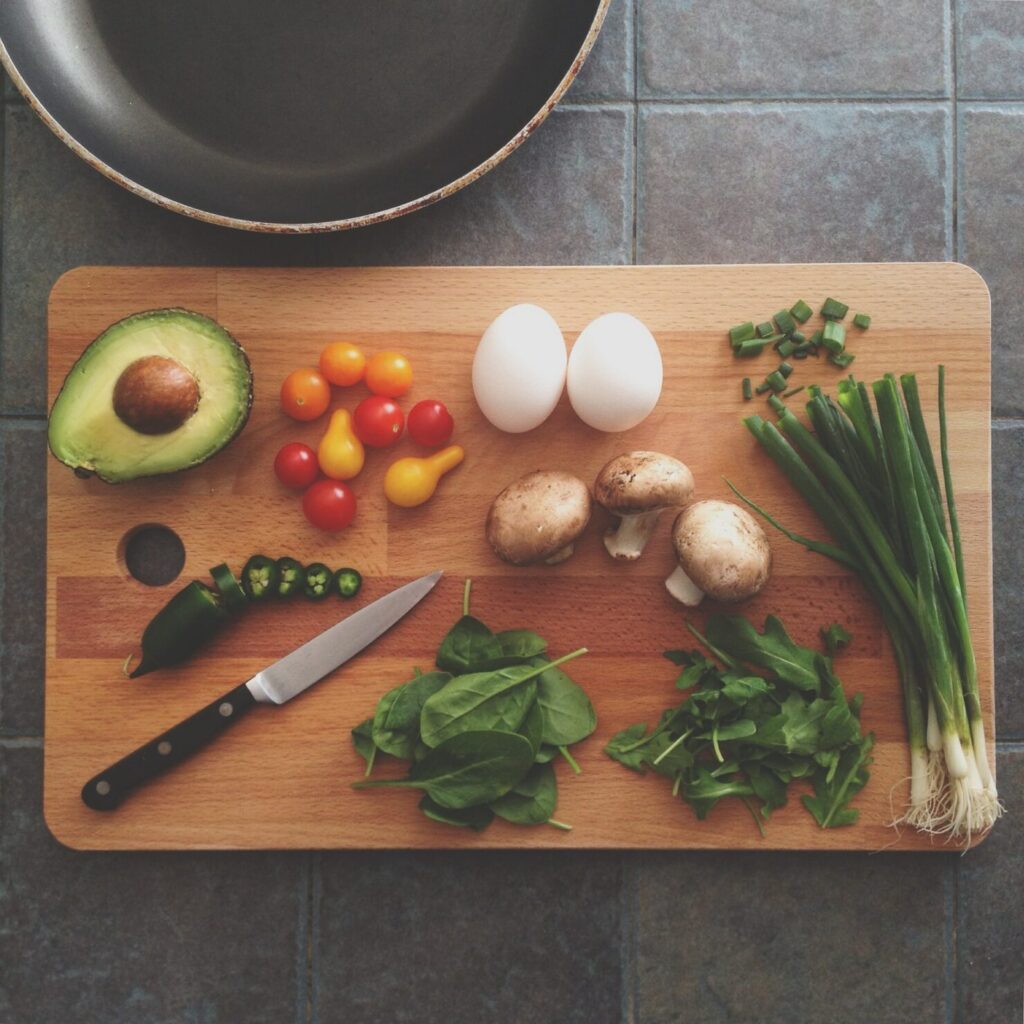
Why is food choice important during pregnancy?
Food is fuel. Food becomes the energy we need to think, speak, move, and work. In essence, there is no life without food! Naturally, that goes double for expectant mothers. We know that nutrition is sometimes seen as nothing more than calorie counting, but those numbers are just the tip of the iceberg (…lettuce). In general, minimally processed foods are more nutrient-dense than their processed, fried, or sugar-saturated counterparts. Even pregnant, you can reach most of your essential nutrient goals with food. Keep reading to find out how!
Whole fruits and veggies:
Full of vitamins and minerals, eating plenty of fresh (or frozen) produce is a great way to reach daily nutritional goals. Think of apples, oranges, pineapple, bananas, berries, or stone fruits (just be careful of the pits!). Fruit can be a stand-alone snack, blended into a smoothie (a great base for extra nutrients like yogurt, nut butter, chia seeds, and much more), added to sandwiches or salads, or even topped with a few chocolate chips for dessert.
Despite their lackluster reputation, vegetables remain one of the most important food groups. The key is to find veggie preparations that are flavorful and exciting. Some recommended veggies include broccoli, beets, spinach, tomatoes, bell peppers, squash/courgettes, and sweet potatoes. Whether you give vegetables a supporting role as a side dish or showcase them in a personalized salad, getting enough veggies is vital for overall health.
Did you know? Vitamin C helps with iron absorption, but calcium inhibits it. Try to avoid consuming calcium at the same time as iron.
Lean protein:
Prioritizing protein is not exclusive to athletes and powerlifters. The benefits of getting enough protein cannot be overstated, considering its primary role is building cell tissue (hello, baby!). If that doesn’t convince you of its importance, consider this: everyone breaks down protein into chains of amino acids that improve bone density, create hormones, and boost your metabolism and immune system.
Complete proteins are guaranteed in meat sources like chicken, turkey, lean red meat, fish, or pork. Of course, non-meat proteins are still beneficial to a healthy diet. The most versatile options are eggs, low-fat yogurt, legumes, seeds/nuts, beans, quinoa, or tofu. Many sources, like eggs and seeds/nuts, also provide extra minerals and healthy fats. Having at least one lean protein source (for example, grilled chicken rather than a hamburger or bacon) with every meal is a great way to ensure your daily intake can sustain two lives at once.
Fun fact: Being pregnant dramatically increases your need for protein. Check out this calculator to estimate how much you should aim for in a day.
Healthy fats:
Fat is essential for all organs (even skin!), but it is especially crucial for brain health. As previously mentioned, nuts and seeds are sources of heart-healthy fats that provide long-term energy and keep organs functioning efficiently. Beyond normal organ function, nuts and seeds also contain high levels of zinc, in which roughly 60% of expectant mothers are deficient. Just three tablespoons of hemp seeds, for example, contain 37% of a woman’s daily recommended amount of zinc. Other healthy fat sources are avocados, olive oil, or seafood. But, keep in mind that too much of a good thing, like avocado toast, can lead to high cholesterol.
Whole grains:
Last but certainly not least, carbs! Humans are built to metabolize carbohydrates faster than proteins or fats. This means that most of our daily energy comes from carbs that have been broken down into sugar and made available to complete necessary functions. Even breathing takes short-term energy, so imagine how crucial readily accessible energy is when growing another human being…
Did you know? Research shows that whole grains lower your risk of heart disease, so the short-term necessity doubles as long-term armor!
Sounds great, right? Well, unfortunately, we can’t always have our cake and eat it, too (pun intended). Some highly processed forms of carbs are convenient but not as nourishing. Whole grains like brown rice, whole wheat bread or pasta, oatmeal, millet, or bran offer both necessary energy and, the real star of the show, fiber. Fiber is a carbohydrate that cannot be broken down and turned into energy, so it aids in digestion and helps stabilize your metabolism. Read: combats constipation and keeps you feeling full for longer.
What happens when food alone isn’t enough?
Trying to eat perfectly can feel impossible and overwhelming, but don’t worry. Reaching every single nutritional goal every day is a challenge to people sustaining themselves alone. That’s why prenatal vitamins/supplements are usually recommended.
Depending on your needs, you may need specific nutrients and amounts, so it is important to consult your doctor and personalize a prenatal supplement plan. One size does not fit all!
Even your needs will likely change throughout your pregnancy, so be sure to regularly communicate with your doctor about supplements.
Wondering which micronutrients you can expect to find in prenatal supplements? In general, you’ll find nutrition labels with a combination of iron, iodine, calcium, folic acid, and vitamins A, C, D, and a B-complex.
Sources
https://www.healthline.com/nutrition/13-foods-to-eat-when-pregnant1
https://health.gov/myhealthfinder/pregnancy/nutrition-and-physical-activity/eat-healthy-during-pregnancy-quick-tips
https://www.womenshealth.gov/pregnancy/youre-pregnant-now-what/staying-healthy-and-safe
https://www.healthline.com/nutrition/best-foods-high-in-zinc#TOC_TITLE_HDR_5
https://www.sciencedirect.com/science/article/pii/S0022316622101975#:~:text=Nearly%20one%20third%20of%20the
,%3C%20110%20g%2FL).
https://pubmed.ncbi.nlm.nih.gov/35681238/


